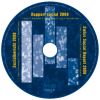Summary of the review of Georges Lüdi and Iwar Werlen
![]()
Multilingualism – an opportunity for Switzerland?
Switzerland is becoming more and more multilingual. This refers not only to the number of languages spoken in Switzerland (particularly in urban areas), but also to individual multilingualism. The goal of this review by Georges Lüdi and Iwar Werlen* is to document this with the newest figures. Based on the public debate in recent years, there are three main questions: firstly, the role of the national languages as foreign languages and as a means of communication between the different language areas; secondly, the increasing significance of English as a foreign language, as the language in business and science, but also as a language that aids communication within Switzerland; thirdly, the question of how the many people who speak different (non-Swiss) languages in Switzerland deal with their multilingualism in the area of friction between their language of origin or mother tongue, the national language spoken where they live and the international working languages.The data which were evaluated for this review stem first of all from the Federal Population Census from 1990 and 2000, in which questions not only about the main language, but also about the family language and the working language had to be answered. For the first time, this gave us a comprehensive insight into language use in the Swiss population. But these results are almost ten years old. In the Swiss National Science Foundation’s National Research Programme 56 ‘Language variety and language competence in Switzerland’, the University of Berne organized a representative survey on language competence and attitudes, as well as on language use in Switzerland, and the findings are reflected in this review. Finally, use was made of school statistics and other studies. On the basis of these data, the review deals with current topics in politics and the public arena. Also included are themes from education relating to the future of the national languages as Swiss working languages – whether complementary to or in competition with English – and also to the role of immigrant languages of origin as cultural and economic links to their regions of origin all over the world.
* This review is included in the German and French editions of the Swiss Social Report 2008 only.
Update: FORS
